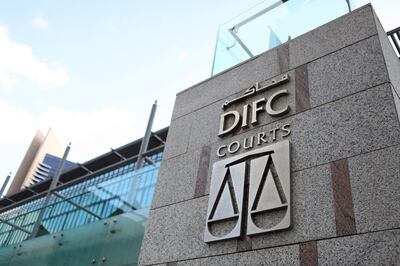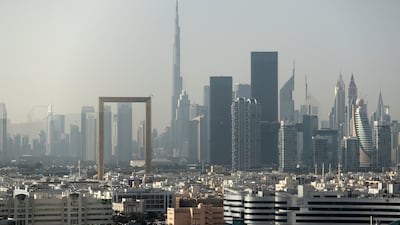Dubai will set up a new body to resolve jurisdictional conflicts between Dubai International Financial Centre (DIFC) Courts and the domestic courts in a move lawyers say will streamline the justice system.
A decree issued on Monday by Sheikh Mohammed bin Rashid, Vice President and Ruler of Dubai, will replace a previous tribunal with a new authority with a broader mandate.
The provisions of the decree are applicable to DIFC Courts and other judicial bodies such as the Court of Cassation, the Court of Appeal and the Court of First Instance, and any other court that will be set up as part of the judicial authority in Dubai.
It is hoped decisions handed down by the judicial authority will result in clarity and consistency in this important area of law
Nicholas Sharratt,
Norton Rose Fulbright
A jurisdictional conflict may arise when a company based in DIFC has a dispute with a firm based on the mainland, and there are questions over which court should handle the case, lawyers told The National.
Byron James, a partner at the UAE law firm Expatriate Law, said Monday's decision is a “strategic move to enhance the efficiency of the judicial process and address any potential overlaps or conflicts in jurisdiction between these courts”.
The new body will be headed by the president of the Court of Cassation at Dubai Courts, while the deputy chief justice of DIFC Courts will serve as its deputy chairman.
Other members of the authority include the secretary general of the Dubai Judicial Council, the president of the Court of Appeal, the president of the Court of First Instance, and two DIFC Courts judges selected by the chief justice of DIFC Courts.
“This change underscores the importance of having a dedicated body to decisively address and resolve jurisdictional disputes, which can arise from the unique dual-court system operating within Dubai, where the DIFC Courts apply a common law framework distinct from the civil law system used by the wider Dubai judicial system.” Mr James said.
The authority will determine the competent court for disputes, specifying enforceable judgments in case of conflicts, and implementing tasks assigned by the Ruler of Dubai or the chairman of the Dubai Judicial Council, Dubai Media Office said in a statement.
The decisions issued by the authority will be final and not subject to appeal in any form, it added.
“It is encouraging to see … [Dubai] taking positive action to provide guidance on the conflicts of jurisdiction between the DIFC Courts and the Dubai Courts,” Nicholas Sharratt, Middle East head of dispute resolution at Norton Rose Fulbright, told The National.
“It is hoped that the decisions handed down by the judicial authority will result in clarity and consistency in this important area of law, particularly in respect of the enforcement of judgments”.
How jurisdictional clashes may occur?
Jurisdictional clashes might typically occur in cases involving parties or contracts that have connections within the DIFC and the rest of Dubai, Mr James said.
It can lead to uncertainties over which court has the authority to hear a case. For example, a contract dispute where one party is based in the DIFC and the other in mainland Dubai could have led to questions over jurisdiction.
“The decree aims to prevent such scenarios by clearly defining a mechanism and authority to determine the competent court swiftly and effectively,” Mr James said.
Originally the DIFC Courts were established to hear cases relating to the DIFC only. But their jurisdiction was extended in October 2011.
Company%20Profile
%3Cp%3E%3Cstrong%3EName%3A%3C%2Fstrong%3E%20HyveGeo%3Cbr%3E%3Cstrong%3EStarted%3A%3C%2Fstrong%3E%202023%3Cbr%3E%3Cstrong%3EFounders%3A%3C%2Fstrong%3E%20Abdulaziz%20bin%20Redha%2C%20Dr%20Samsurin%20Welch%2C%20Eva%20Morales%20and%20Dr%20Harjit%20Singh%3Cbr%3E%3Cstrong%3EBased%3A%20%3C%2Fstrong%3ECambridge%20and%20Dubai%3Cbr%3E%3Cstrong%3ENumber%20of%20employees%3A%3C%2Fstrong%3E%208%3Cbr%3E%3Cstrong%3EIndustry%3A%20%3C%2Fstrong%3ESustainability%20%26amp%3B%20Environment%3Cbr%3E%3Cstrong%3EFunding%3A%20%3C%2Fstrong%3E%24200%2C000%20plus%20undisclosed%20grant%3Cbr%3E%3Cstrong%3EInvestors%3A%20%3C%2Fstrong%3EVenture%20capital%20and%20government%3C%2Fp%3E%0A
French business
France has organised a delegation of leading businesses to travel to Syria. The group was led by French shipping giant CMA CGM, which struck a 30-year contract in May with the Syrian government to develop and run Latakia port. Also present were water and waste management company Suez, defence multinational Thales, and Ellipse Group, which is currently looking into rehabilitating Syrian hospitals.
The Bio
Favourite place in UAE: Al Rams pearling village
What one book should everyone read: Any book written before electricity was invented. When a writer willingly worked under candlelight, you know he/she had a real passion for their craft
Your favourite type of pearl: All of them. No pearl looks the same and each carries its own unique characteristics, like humans
Best time to swim in the sea: When there is enough light to see beneath the surface
Company%C2%A0profile
%3Cp%3E%3Cstrong%3ECompany%20name%3A%20%3C%2Fstrong%3ETuhoon%0D%3Cbr%3E%3Cstrong%3EYear%20started%3A%20%3C%2Fstrong%3EJune%202021%0D%3Cbr%3E%3Cstrong%3ECo-founders%3A%20%3C%2Fstrong%3EFares%20Ghandour%2C%20Dr%20Naif%20Almutawa%2C%20Aymane%20Sennoussi%0D%3Cbr%3E%3Cstrong%3EBased%3A%20%3C%2Fstrong%3ERiyadh%0D%3Cbr%3E%3Cstrong%3ESector%3A%20%3C%2Fstrong%3Ehealth%20care%0D%3Cbr%3E%3Cstrong%3ESize%3A%20%3C%2Fstrong%3E15%20employees%2C%20%24250%2C000%20in%20revenue%0D%3Cbr%3EI%3Cstrong%3Envestment%20stage%3A%20s%3C%2Fstrong%3Eeed%0D%3Cbr%3E%3Cstrong%3EInvestors%3A%20%3C%2Fstrong%3EWamda%20Capital%2C%20Nuwa%20Capital%2C%20angel%20investors%3C%2Fp%3E%0A
Batti Gul Meter Chalu
Producers: KRTI Productions, T-Series
Director: Sree Narayan Singh
Cast: Shahid Kapoor, Shraddha Kapoor, Divyenndu Sharma, Yami Gautam
Rating: 2/5
French Touch
Carla Bruni
(Verve)
Temple numbers
Expected completion: 2022
Height: 24 meters
Ground floor banquet hall: 370 square metres to accommodate about 750 people
Ground floor multipurpose hall: 92 square metres for up to 200 people
First floor main Prayer Hall: 465 square metres to hold 1,500 people at a time
First floor terrace areas: 2,30 square metres
Temple will be spread over 6,900 square metres
Structure includes two basements, ground and first floor
No Shame
Lily Allen
(Parlophone)
ESSENTIALS
The flights
Emirates flies direct from Dubai to Rio de Janeiro from Dh7,000 return including taxes. Avianca fliles from Rio to Cusco via Lima from $399 (Dhxx) return including taxes.
The trip
From US$1,830 per deluxe cabin, twin share, for the one-night Spirit of the Water itinerary and US$4,630 per deluxe cabin for the Peruvian Highlands itinerary, inclusive of meals, and beverages. Surcharges apply for some excursions.



